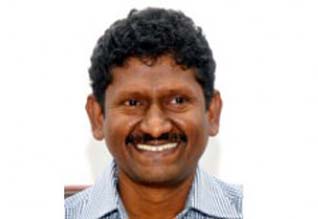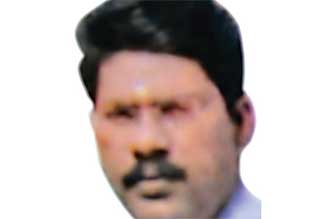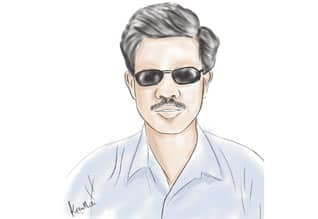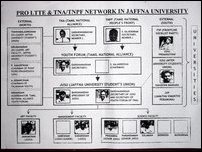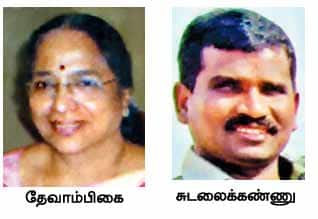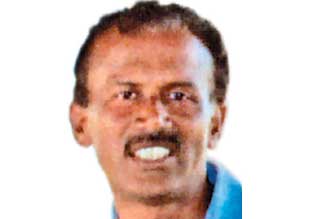Brian identifies Sri Lanka, Australia as beneficiaries of his Singapore deportation
[TamilNet, Sunday, 30 December 2012, 12:35 GMT]
Dr Brian Seneviratne, 81-year-old Australian human rights activist of
Sinhala origin steadfastly fighting for the rights of Tamils in the
island of Sri Lanka, was deported by Singapore immigration on 14
December, when he came from Australia to go to Malaysia and address
closed-door meetings on the push factors of refugees coming from the
island via Malaysia and their handling by Australia. In a letter
addressed to Australian Prime Minister, Ms Julia Gillard, raising
several questions on the modus operandi of his deportation by Singapore
defying a State’s obligation to the international rights of any person,
Brian identifies the Government of Sri Lanka and the Government of
Australia as the ultimate beneficiaries of his deportation.
“Who was responsible: that, Prime Minister, is for you to find out. As a
lawyer you should be able to ask the correct questions – “who would be
threatened by what I had to say in Malaysia”? The possibilities are
limited,” Brian wrote, summing up the possibilities:
- The Government of Sri Lanka – determined to prevent any information
being presented as to what is going on behind the closed and censored
doors of that country, which are responsible for people wanting to flee
the country and seek asylum.
- The Government of Australia, whose handling of these asylum
seekers is an absolute disgrace, and a violation of the UN Refugee
Convention and others, including the Australian Constitution.
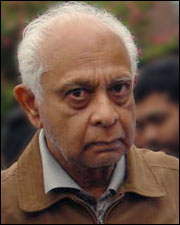
Dr Brian Senewiratne
Brian, according to his letter, was
kept locked in a room at the Changi Airport for 5 hours, denied of
toilet facilities, food and communication, deported by an ‘armed guard’
leading him into the aircraft and was given with his passport back only
in Australia.
He was served with a deportation letter stating:
“This is to inform you that you are refused entry into Singapore for
being ineligible for the issue of a pass under current Immigration
policies.”
Singapore may have its ‘sovereignty’ to refuse entry
to any one. But if a citizen of one country is denied of transit rights
through a second country, at the request of a third country or
countries, then it raises serious questions on the individual
international rights of all humanity in the clutches of States, human
rights activists commented.
Brian was not even permitted to travel back according to his schedule, via Indonesia, but was deported to Brisbane.
As
an Australian citizen, Brian urged the Australian Government to ask 17
questions at the Singapore Government that had deported him. The last of
the questions was: “Did Rohan Guneratna , the supposed ‘world expert on
terrorism’, a Sinhalese, working hand in glove with the Sri Lankan
government, who is employed in Singapore, have anything to do with the
deportation?”
Singapore Government as well as several corporates
and individuals from the country enjoy active trade contacts with the
genocidal regime in Colombo.
Many countries that uphold the
genocidal regime in Colombo, including a power in the region that is in
complicity with it, are suspected of receiving lists from the regime, on
people who should not be given entry into those countries, informed
sources said.
Brian’s case is an illustrative example for the
extent of importance given by the Establishments to the genocidal
experiment of World Order taking place in the island at the cost of
Eezham Tamils, while on one hand doing everything to suppress
information and on the other shedding crocodile tears that the island is
not getting enough world attention, human rights activists commented.
Full text of Brian Senewiratne's letter, dated 14 December 2012, to Australian Prime Minister Julia Gillard follows:Deported for trying to address the serious problem of
Asylum seekers from Sri Lanka
Hon Julia Gillard
Prime Minister of Australia
Office of the Prime Minister
Canberra
ACT 2600
Dear Prime Minister,
I am an 81 year old
Consultant Specialist Physician, who has been an Australia citizen for
36 years. I have had a long-standing interest in human rights, in
particular, the unresolved problem of asylum seekers and the way they
are treated.
What Australia is doing is a violation of the UN
Refugee Convention, the UN Convention on the Rights of the Child and the
Universal Declaration of Human Rights, signed and ratified by
Australia. It is also a violation of the Australian Migration Act and
even the Australian Constitution 1901(Section 75(V)).
I have
been particularly concerned about the so-called ‘push-factors’ which
make people seek asylum in Australia and other countries.
The
problem of asylum seekers trying to get to Australia has also created
problems in Malaysia and Indonesia. Moreover, as you well know, there
have also been attempts to use these countries (and others) as off shore
detention centres for asylum seekers. This is illegal.
Concerned
Malaysians invited me to address two meetings in Malaysia (15th
December 2012 in Johor, and the following day in Kuala Lumpur). Since
Johor is literally next to Singapore, it made sense to fly to Singapore
and take a coach to Johor.
On arrival in Singapore on the 14th
December (today), I was refused admission, held incommunicado in a
locked room for five hours without even basic amenities such as food or
water, or facilities such as a toilet, and deported by an armed
policeman to the flight back to Brisbane.
My request for the
return of my passport, a fundamental right, was refused. It was only
given back to me in Brisbane, and that too after a significant delay.
Singapore
refused my right to travel to Malaysia or to Indonesia, which is not
only high-handed but illegal. Singapore could stop me entering that
country, but had no right to stop me from getting to another country.
This
is a serious problem that has already generated national and
international concern. I hope it will be taken up in the Australian
parliament after the recess.
I am entitled to an explanation. As a
citizen of this country, and you, as the Prime Minister, have a duty to
get this for me, if being an Australian citizen is to have any meaning.
The
date of this letter is correct since it was written on the way back
home. The delay in sending it to you is that I have rarely written a
letter in anger, but have allowed a ‘cooling off’ period to lapse, and
to also try and make sense of this senseless act.
I will set out
in detail what was done to me. I will first give a brief account of who I
am and what I was trying to do. This should not be necessary, since no
citizen of this country should be treated like this.
My position
- I have been an Australian citizen for 36 years (from 1976).
-
I am a Consultant Physician, and have, for two and a half decades, been
a Senior Visiting Physician in a major teaching Hospital in Brisbane
(Princess Alexandra Hospital), and a Clinical Associate Professor of
Medicine. I currently work as a Consultant Physician in Brisbane. I have
a Specialist registration in General Medicine and in Gastroenterology.
-
In addition to Medicine, I have had a long-term commitment to human
rights and have been the recipient of a dozen international awards,
which I will not list here but will be glad to send you.
-
I have been invited to address meetings in the British parliament
(‘House of Commons’), the European Parliament, the Indian Parliamentary
complex, the Canadian parliamentary complex, and even the Australian
parliament. I was granted an audience with the Nobel Laureate,
Archbishop Desmond Tutu in South Africa, to discuss the escalation of
human rights violation in Sri Lanka which has been of serious concern to
him.
I have addressed scores of meetings in Australia and
across the world over three decades, and attended the UN Human Rights
Council meetings in Geneva.
I have been invited to meet, and met, staff of the Office of the UN Special Adviser on the Prevention of Genocide in New York.
-
I am of Sri Lankan origin, from the majority Sinhalese community, and
not from the brutalised Tamil community who form the vast majority of
asylum seekers arriving in Australia. The past President of Sri Lanka,
Chandrika Bandaranaike Kumaratunga, was my cousin. When I met Archbishop
Tutu, he repeatedly said, “Isn’t it wonderful that a Sinhalese should
be campaigning for the Tamils for more than six decades”.
-
I have published scores of articles on the humanitarian crisis in Sri
Lanka, the war crimes and crimes against humanity that have been
committed, the dismantling of democracy and the establishment of a
Totalitarian State. I have also recorded nearly a dozen dvds to show the
humanitarian crisis in that country.
- I have been
seriously concerned with what is going on behind the closed and censored
doors of Sri Lanka where despite the end of the ‘war’, the Sri Lankan
government still refuses to allow Amnesty International (AI), Human
Rights Watch (HRW), International Crisis Group (ICG), and all
independent international observers, access to the Tamil areas in the
North and East.
- I have also been concerned with the
fall out of the chaos in Sri Lanka, especially on countries such as
Australia, and the way asylum seekers are treated by Australia. As I
have said, there is overwhelming evidence that asylum seekers and
refugees are treated in Australia in violation of international
Conventions and even domestic laws and the Australian Constitution which
I have indicated earlier.
- I have nothing to gain
personally from getting involved in all this except my concern for human
beings and the way they are treated by a succession of Sri Lankan
governments, and a succession of Australian governments.
-
Of serious concern has been the disinformation campaign of the Sri
Lankan government as to what has gone on, and is still going on, to this
very day, in that country. It is to address this disinformation
campaign that I have spent thousands of dollars of my money and
thousands of hours of time and energy, over many years.
The problem
-
There have been international concerns about the humanitarian situation
in Sri Lanka, in particular, the human rights of the Tamil people.
-
This was discussed extensively in the March 2012 meeting of the UN
Human Rights Council (HRC) in Geneva, the November-December 2012 UN
Universal Periodic Review, and is to be discussed again at the March
2013 meeting of the UN HRC.
- Every major human rights
group in the world (AI, HRW, ICG) has continued to publish report after
report to express their concerns. So has the UN Secretary-General’s
Panel of Experts appointed by him to look into accountability in Sri
Lanka, which submitted a devastating 200 page Report on 31 March 2012.
The Sri Lankan government was accused of lying. These senior lawyers
strongly recommended an international independent investigation into war
crimes and crimes against humanity which the Sri Lankan government has
flatly rejected.
- This humanitarian problem in Sri
Lanka is resulting in a flood of asylum seekers not only to Australia
and New Zealand, but to Malaysia, Indonesia, India and several western
countries (the UK, Europe, Canada, and the USA). It is therefore not
just a problem confined to Australia.
- Concerned people
in Malaysia, many of them respected members of civil society, decided to
act. The first time was in March 2009, and the again in December 2012.
March 2009 In
March 2009, when I was returning to Australia after receiving a major
international award for human rights in Canada, I was told that there
were hundreds of people in Malaysia who wanted to hear me. Would I stop
over in Malaysia to address several meetings in Kuala Lumpur and in
Penang? I said I would. Police permission was obtained for these
meetings.
Here is the
Canadian Award they referred to:
“Canadians for Genocide Education. Educators Award 2009.
Presented on March 25,2009 to
Dr Brian Senewiratne.
In recognition of his dedication to Inclusivity and Equity in Genocide Education.
James Katieh Executive Secretary, John Gregorovich Chairman.In accepting the Award, I chose to speak on:
“Peace with Justice in Sri Lanka. Genocide of Sri Lankan Tamils. Its Causes and Solutions”.Canadians for Genocide Education consists of some 46 groups, which include the
Buddhist Communities of Greater Toronto, the Canadian Islamic Congress, and
many others. Here is the contact: JK_CGE@hotmail.com.
However,
when I arrived in Kuala Lumpur on 27th March 2009, I was held at
Immigration for 7 hours and deported. The ‘reason’ was equally vague,
“Your presence in Malaysia is a ‘security concern’”. It was unclear how
a 79 year old man who had never handled a weapon in his life was a
‘security concern’ to Malaysia.
I was taken by six policemen (!),
two security guards and as Immigration officer to the next flight to
Brisbane. At least they gave me back my passport, which is more than
what Singapore did in December 2012.
Investigating this, it was
revealed that the Malaysian authorities were responding to a direct
request from the then Sri Lankan Foreign Minister.
The Malaysian Award (which I could not collect) was posted to me. It was a pewter plaque:
“The
Malaysian-Sri Lankan Diaspora Fellowship Award is presented to
Associate Professor Dr Brian Senewiratne
Consulting Professor, Princess Alexandra Hospital, Brisbane
For his excellent contribution to the International Sri Lankan Diaspora
in promoting peace and goodwill in campaigning for human rights and
safety of globally displaced peoples.
27th March 2009.
December 2012With
increasing concerns about what was going on behind the closed and
censored doors of Sri Lanka which was responsible for the flood of
asylum seekers/refugees to Malaysia, concerned Malaysians decided to
invite me back to Malaysia to address two meetings in Johor (15th
December) and Kuala Lumpur (16th December).
I have already
explained why I was in Singapore – to board the coach to adjacent Johor
(in Malaysia) to address the first meeting, and then proceed to Kuala
Lumpur, address another meeting, and then fly out to Indonesia (for some
medical commitments), and return to Brisbane on Christmas Day.
What was this all about? As
I have said, I was invited to Malaysia to address two meetings on
asylum seekers, the push factors from Sri Lanka, and the problem of
handling refugees/asylum seekers on arrival here via Malaysia or sent
there by the Australian government.
These addresses were for an
invited audience of concerned people. They were not public
demonstrations or rabble rousing activities. Nor were they public
appeals urging the people to storm the Sri Lankan Embassy. They were
‘closed doors’ serious discussions with much respected people of high
standing in Malaysia.
The sequence of eventsWith an Australian passport, I did not need a visa to enter either Singapore or Malaysia.
I
left Brisbane at 11.45 pm on 13th December, 2012, on a Singapore
airlines flight, and arrived in Singapore at 5.10 am on 14th December.
My luggage was off loaded in Singapore.
- I got to the
immigration counter and produced the arrival card and my passport. The
Immigration officer typed in my details, raised his eyebrows and said
‘Oh!”. This raising of eyebrows was done three times. Cleary he had seen
something ‘interesting’ or ‘of concern’. What did he see that was of
concern? He asked me to stand aside till he saw his ‘boss’.
-
After some time another man, presumably the ‘boss’, arrived and asked
me to come with him. He punched in a code which opened a door to a very
small room. He asked me to sit down and wait. There were some plastic
chairs, a notice on the wall that cameras, mobile phones etc could not
be used and a glass window for ‘observation’. It clearly was, since as
soon as my mobile phone rang, an officer was there in a flash and
pointed to the notice on the wall. “No phones allowed”.
There was
certainly no toilet –something that worried me because I am on a
diuretic (which increases urine flow – treatment for early heart
failure), and a moderately severe prostate obstruction. At the age of
81, on a diuretic and an enlarged prostate, lack of access to a toilet
is a concern.
- From time to time some dark Asian boys
were led into this room. They spoke Tamil, a language I do not
understand. They were taken in one by one to another room, they
reappeared with a piece of paper, the locked door was opened and they
were sent out. It is important to appreciate that immigration officers
were constantly coming in and out of this locked room, though they did
not pay any attention to me. I just sat, and sat, and sat - 5.30am, 6.00
am, 6.30am, 7.00 am.
- With nothing to do, I thought I
would get my powerpoint presentation sorted out and got out my computer.
The immigration officer was there in a flash, “No computers”. I summoned up enough courage to do the unthinkable in Singapore– to ask, “Why can I not use my computer?”
-
The Officer seemed irritated that I had actually questioned him. “How
do I know that you do not have a transmitting device in your computer to
communicate”. I said that I had no such device and he was welcome to
check my computer. He said “I will ask my boss”.
He did not even bother to tell me the answer, but simply stood at the window and crossed his arms – “No” it was.
-
It was nearly 8am. My last meal was at about 3.30am on the plane and I
was beginning to feel faint. I asked one of the immigration officers
coming in and out of the room, whether I could get something to eat and
drink. I was not asking for a donation. I said I would pay for it. It
was the usual “No”.
I then asked for the toilet, explaining that my bladder was severely distended. The answer was the now familiar “No”.
I could, of course, have wet my pants but this might have been interpreted, “He was so guilty that he even wet his pants”.
Moreover, I had no change of clothes, these being in my suitcase which
was inaccessible. I could have simply urinated in a corner of the room.
Then there was the possibility of being charged for ‘wilful damage to
government property’. There are heaps of reasons (or no reason at all)
to be charged in all dictatorships and totalitarian regimes, which I
know full well having studied Singapore’s stable-mate, Sri Lanka.
To
‘fast-forward’ this, when Immigration, or to give it its full name,
Singapore Immigration and Checkpoint Authority – SICA) was contacted by
the Singapore media, they said that what I had claimed was untrue. Would
they like me to send my lawyer to Singapore to that locked room where
they can show him the invisible toilet? If what Singapore’s ICA did was
outrageous – to hold incommunicado in a locked room an Australian
citizen - the least they can do is not to lie about what happened.
- At 8 am an Immigration officer came and spoke with me in the locked room. “You can go to Malaysia but not by coach. You will have to fly”.
I could not see his logic unless he thought that in the 2 hours I was
going to be in Singapore, I would blow the place up or start a riot. If
that was his concern, he could have searched me, strip searched if
necessary.
I was not going to push my luck by questioning his logic. This is Singapore
where one does not open one’s mouth except to eat – and I was not doing
any of that.
- At 8.30 am he reappeared with a different
story. I could not go to Malaysia by air or land. It is important to
find out what happened between 8am and 8.30am for this change of mind.
Was there a call to Malaysia, or Australia, or even bonny Sri Lanka (to
give it its thoroughly inaccurate name, the Democratic Socialist
Republic of Sri Lanka – about as ‘democratic’ as Singapore)?
-
I asked him whether I could go to Bali (Indonesia) where I had medical
work to do and had a hotel booked for the 17th, but could find
accommodation immediately (14th). The answer was “No. From Brisbane
you came, to Brisbane you go. You are being deported. A Police officer
will come to take you to the next flight to Brisbane”.
-
Why did I not telephone the Australian High Commissioner in Singapore?
After all, the man is paid by me (and all other taxpayers in Australia)
to look after Australians. Here was an Australian citizen and taxpayer
facing difficulties – to put it mildly.
Well, I could not because
I was not allowed to use my mobile phone. I did not want to press the
issue because of the real possibility that they would say, “You were
born in Sri Lanka, to Sri Lanka you go”. That would have been a disaster
in a country that has the world’s highest rate of involuntary
disappearances.
Sri Lanka would have welcomed my arrival and even
provided free transport – a white van with no number plates - that
would have taken me to an undisclosed destination. In Sri Lankan
language today, I would have been ‘white-vanned”.
- At
about 8.30 am a Police officer arrived to take me to the plane – a
Singapore airline flight to Brisbane. We had to go in a series of trains
from one terminal to the other. I noticed that the Police officer was
armed. I asked him whether he was. He said, “Yes. There are auxiliary Police who are armed and some who are not armed. I am armed”. I ventured to ask him whether the weapon had live ammunition. He said, “Yes, it has live ammunition” - not the sort of thing you want to hear. I could only hope that the safety catch was on.
The
Singapore authorities will have to explain the need for a policeman
armed with live ammunition, to take an 81 year old unarmed man to the
aircraft. Did they think that a sudden run was possible resulting in the
need to open fire?
- I thought I might inquire why I was
being deported. The policeman said, “Oh Yes. Here is the Deportation
Order”, and handed me the document I have already referred to. It was
short and sweet, and said nothing. Here it is in full:
Notice of Refusal of Entry
Issued by the Immigration and Check-point Authority – “Notice of Refusal of Entry No DA 085308.
Place of issue Changi Airport PTB 11
This is to inform you that
you are refused entry into Singapore for being ineligible for the issue
of a pass under current Immigration policies
Signed CI 2 Tan Hock Guan Michael
For Controller of Immigration
Singapore
Dated 14.12.2012
I was conducted to my seat, a few rows
from the toilet! During the flight some of the passengers who clearly
knew me (I have worked in Brisbane as a Consultant Physician for 36
years) came and asked me, “Doc, are you alright? We saw a policeman
bring you to the plane. Is there a problem?” I said that there was a
‘problem’ but that this was not the place to discuss it. I thanked them
for their concerns.
This public humiliation raises legal issues
by way of damage done to my medical practice in Brisbane. I will discuss
this with my lawyers.
- Eight hours later, I was back in
Brisbane. Prime Minister Gillard, consider this: I got to the Brisbane
airport 3 hours before the flight – as was required. A 7+ hour flight to
Singapore. Then 5 hours in custody in a locked room. 7+ hours back.
That is 23 hours. At 81, in heart failure (yes, mild, but heart failure
nonetheless), it is not exactly a walk in the park.
- The
ordeal was not yet over. The plane landed at 9pm. There was then
considerable difficulty in finding my passport. Since this is due to the
incompetence of Singapore Airlines, I will not go into this.
What happened on the other side of the barrier in SingaporeI was not allowed to contact whoever had come to meet me in Singapore. I was later told what had happened.
Someone had flown into Singapore to meet me and take me to the coach. He came to the airport at 4.30 am, and waited for me.
Through
the glass door, he saw the bags being picked up by the passengers. One
black bag was going round and round on carousel 37. He tried to get to
the bag to check the tag to see if it was mine. As he entered the area
the alarm went off.
Security came and asked him what he was doing. He said,
“I am trying to see if that bag belongs to Dr Brian Senewiratne”. The official said,
“I will check it, but you first get out of this area”. He did. The official checked the label and told him that it was mine. He asked,
“So where is the passenger? The official said,
“He has been refused entry into Singapore”.He went to the information desk and asked to see the passenger list. The answer,
“No. See Immigration”. He did, and confirmed that I had been refused entry. He asked,
“Can I speak with him? Answer:
“No” “Can you tell him that I am here?” Answer:
“No”. In desperation, he asked,
‘So, what can I do?”. The Official replied,
“Get lost”.
That is Singapore in a nut shell.
He
did a little more than ‘getting lost’. He called Johor and cancelled
the meeting I was to address. He cancelled the hotel booking where I was
to spend the night before leaving for Kuala Lumpur. He called Kuala
Lumpur and cancelled the meeting there and the hotel booking.
There
was one point which might shed some light as to who was responsible.
When he came out of the baggage area, there was a crowd of men talking
in Sinhalese. They had probably come to ‘welcome’ me and make sure I had
not entered Singapore. Sensing danger, he hurried on (wisely).
Questions that you should ask the Singapore Goverment
- Why was an Australian citizen with a valid passport deported?
- What are the “current Immigration policies” that made him “ineligible for the issue of a pass” to enter Singapore?
- What did the Immigration officer see on the computer that made him raise his
eyebrows (thrice), and say ‘Oh”? Who put it there and when?
- If there were ‘concerns’ about an Australian citizen, was the
Australian High Commissioner in Singapore informed? If not, why not?
- Is the treatment given to an Australian citizen, an 81 year old Senior Specialist Physician, appropriate?
- What is the difference between travelling to Malaysia by coach or by air?
- Why was there a decision change between 8 am and 8.30 am – ‘You can go to Malaysia by air’ to ‘You cannot go to Malaysia?’
- What right had an Immigration officer to tell an Australian
citizen where he could or could not go? His job was to allow him into
Singapore or refuse entry, hand back his passport and luggage and allow
him to go where he chose.
- What was the need for an armed Police officer to take him to the aircraft?
- Why was the Deportation Order not given to him by Immigration? Why was it done just before he entered the aircraft?
- Why was his Passport not returned to him when he left Singapore?
- What right had the Singapore authorities to hand it over to
Security in Australia? Is Australian security a business of Singapore –
and of a mere immigration officer at that?
- Did the Sri Lankan government or agents of the government, contact Singapore or vice versa?
- Did the Malaysian government or the Sri Lankan Embassy in Malaysia contact Singapore or vice versa?
- Did the Australian government contact Singapore about me, or vice versa?
- If the answer to the above three questions is ‘yes’, what was discussed and why was the Australian Embassy not informed.
- Did Rohan Guneratna1, the supposed ‘world expert on
terrorism’, a Sinhalese, working hand in glove with the Sri Lankan
government, who is employed in Singapore, have anything to do with the
deportation?
Who was responsible?That, Prime
Minister, is for you to find out. As a lawyer you should be able to ask
the correct questions – “who would be threatened by what I had to say in
Malaysia”? The possibilities are limited.
- The Government
of Sri Lanka – determined to prevent any information being presented as
to what is going on behind the closed and censored doors of that
country, which are responsible for people wanting to flee the country
and seek asylum.
- The Government of Australia whose handling of these asylum
seekers is an absolute disgrace, and a violation of the UN Refugee
Convention and others, including the Australian Constitution.
CirculationI am forwarding a copy of
this letter to Julian Burnside QC, who has been heavily involved with
asylum seekers/refugees, to Geoffrey Robertson QC, London, a former
Australian and now a leading British lawyer who has expressed concern as
to what is going on in Sri Lanka, to Senators Lee Rhiannon, Sarah
Hanson-Young and Larissa Waters – all of the Green’s Party of which I am
now a member, to the Refugee Council of Australia to be distributed to
members of this exceptional organisation, to the Australian Refugee
Foundation and its very distinguished Patrons, some of whom I have met,
to former Democratic party leader, former Senator Andrew Bartlett, now
in the Greens party, and to Hon Kevin Rudd MP, my Federal member of
parliament.
I am also sending a copy to:
- Archbishop Desmond Tutu, whom I have met in Cape Town, and who
has serious concerns about what is going on. He has expressed these
frequently and forcefully.
- John Murphy, formerly the most senior British member of the
European Parliament, whom I know very well. He has offered whatever help
I need. I have no doubt that he will have this taken up in London.
- Judy Sgro, Canadian parliamentarian, and a former Minister of
Immigration, whom I know and who has a particular interest in Sri Lanka.
- The Australian Medical Association of which I am a member.
In summaryA citizen of Australia, who
has been recognised nationally and internationally for his work in human
rights over six decades, was trying to address a serious problem facing
this, and neighbouring countries. He is harassed and deported by
another country on some very dubious grounds. Do you not think you
should act?
Yours sincerely
Brian Senewiratne
Copy.
Hon Kevin Rudd MP for Griffith.
Hon Bob Carr, Foreign Minister, DFAT, Canberra.
1 In an outstanding article, Amir Butler, Australian Muslim
Public Affairs Committee (AMPAC) has seriously questioned his activity.
http://muslimvillage.com/forums/topic/58-who-is-rohan-gunaratna-the-self-proclaimed-al-qaeda-expert/


